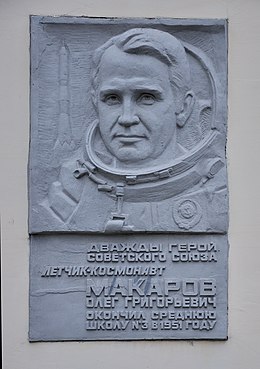Oleg Makarov (cosmonaut)
Oleg Makarov | |
|---|---|
 Oleg Makarov (right) on a 1979 Soviet stamp | |
| Born | 6 January 1933 |
| Died | 28 May 2003 (aged 70) |
| Nationality | |
| Occupation | Engineer |
| Awards |
|
| Space career | |
| Cosmonaut | |
Time in space | 20d 17h 20m |
| Selection | Civilian Specialist Group 3 |
| Missions | Soyuz 12, Soyuz 18a, Soyuz 27, Soyuz 26, Soyuz T-3 |
Oleg Grigoryevich Makarov (Template:Lang-ru) (6 January 1933 – 28 May 2003) was a Soviet cosmonaut.
Early Life and Education

Makarov was born in Udomlya, Tver Oblast, USSR. He graduated from Bauman Moscow Higher Technical School in 1957 and started working at the Special Design Bureau Number One (which is now RSC Energia) as an engineer, working on the Vostok spacecraft.[1] In 1966, he was selected for cosmonaut training.
Space Program
He was originally part of the Soviet lunar program and was training with Aleksei Leonov for the first manned circumlunar flight.[1][2] After the success of Apollo 8, however, the flight was cancelled.
His first spaceflight was Soyuz 12 in 1973, a test flight to check the changes made to the Soyuz spacecraft after the Soyuz 11 disaster. His second flight was the abortive Soyuz 18a that made an emergency landing in the Altay Mountains, 21 minutes after launch. With his third launch on Soyuz 27 he flew to space station Salyut 6 and landed five days later with the Soyuz 26 spacecraft. His last mission was Soyuz T-3, during which several repairs on Salyut 6 were done. He also served on the backup crews for Soyuz 17 and Soyuz T-2. Altogether he spent 20 days, 17 hours, and 44 minutes in space.
After his final spaceflight he continued to work for Energia, both in the Mir space station program as well as the Energia-Buran development.
He received the following awards:
- Pilot-Cosmonaut of the USSR
- Twice Hero of the Soviet Union
- Four times the Order of Lenin
- Order "Blue Nile" (Ethiopia)
- Honorary Citizen of: Dzhezkazgan (Kazakhstan), Rivne (Ukraine), Yakutsk (Russia).
Death
He died in Moscow, Russia, in 2003 from a heart attack.
References
Literature
- S. P. Korolev. Encyclopedia of life and creativity" - edited by C. A. Lopota, RSC Energia. S. P. Korolev, 2014 ISBN 978-5-906674-04-3
- Макаров Олег Григорьевич. warheroes.ru (in Russian)
- The official website of the city administration Baikonur - Honorary citizens of Baikonur]
